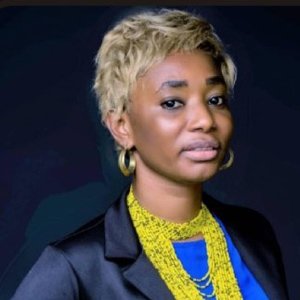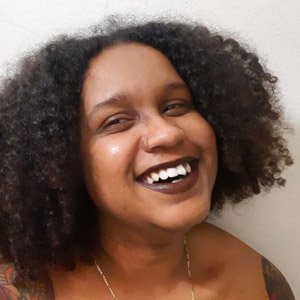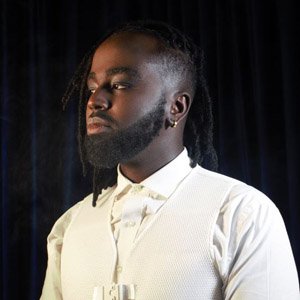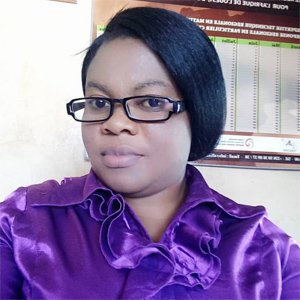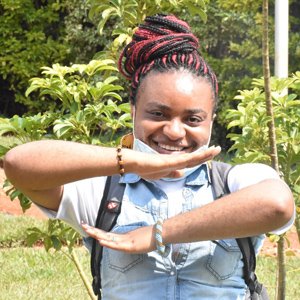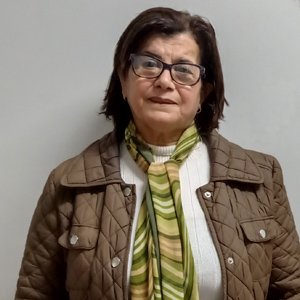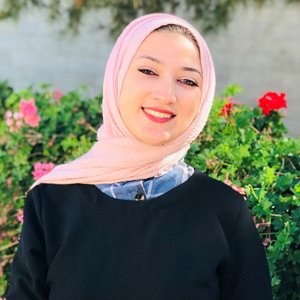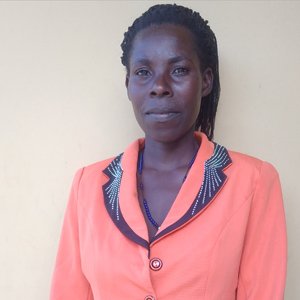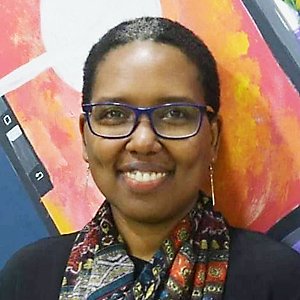2021
THE WOMEN HAVE WINGS AWARDS
Elizabeth Musah-Conteh
Sierra Leone
Elizabeth Agatha Musah-Conteh is a Feminist, an Advocate, Social Entrepreneur, and founder of 4HER Initiative, a woman and girl empowerment organization established in 2018 to positively transform and impact the livelihoods and wellbeing of vulnerable and deprived girls and women in Sierra Leone. She is ambitious, result-oriented, and believes in tolerance, integrity, and compassion for everyone. Elizabeth is creative with exceptional interpersonal and problem-solving skills. She is adventurous and finds so much passion in serving humanity, thus making the world a better place for all.
She holds a BSc. (Hons) in Financial Services from the Institute of Public Administration (IPAM) and an MSc. in Development Management from the University of Sierra Leone. She is a YALI 2017 Fellow and among the 100 Most Influential Young People Global Award, 2020, for her outstanding work to change the world.
As an Activist, the bulk of her work goes towards philanthropic ventures. She provides mentorship, scholarships to school girls, gifts, sanitary and hygiene materials to young women and girls to maintain their dignity and pride, food and clothes, mentorship, education.
“Life is better when we all smile together.”
Isu Oham
Nigeria
Isu Oham is a young professional working with African Girls Empowerment Network to advance gender equality in girls education as well as girls and women’s sexual and reproductive health & rights; end child marriage, teenage pregnancy, and other traditional practices that barrier girls’ education such as female genital mutilation. She is 29, a registered nurse, and a graduate of the School of Nursing Ogoja, Cross River. Before joining African Girls Empowerment Network, Isu has worked and practiced Nursing in a reputable health care center in Cross River State Nigeria with over 3 years of experience in maternal and reproductive health, family planning and women’s access to modern contraceptive methods.
Andriana Theochari
Greece
Andriana Theochari is a journalist and filmmaker based in Athens, Greece. Her first documentary, “Escape To Justice” in partnership with GlobalGirl Media Greece is now showing at film festivals around the world. She is the director of GlobalGirl media Greek program.
L’Orangelis T. Negron
Puerto Rico
L’Orangelis T. Negron (she/he) is a student and improviser of various disciplines, from Bomba, sewing, movement, artivism, among others. She is a community organizer of decentralized transfeminist and anti-racist spaces that are safe for menstruating people and people living with HIV. Her work is directed at HIV and Reproductive Justice, including menstrual awareness. It is viewed in a variety of ways, and explores the cycles that are part of our lives, from using menstrual blood as paint for drawing, graphic design targeting HIV, calligraphy at various scales, creating medicinal items, and developing workshops and diagrams for intergenerational dialogues.
Nerima
Kenya
Nerima is a performance artist and scholar who is interested in how the arts harbor and shape while also promoting self-expression and determination. Their approach to social inclusion work is informed by their arts background and focuses on empowering TLGBQ+ people of African descent. They co-founded the Queer African Network, a social and professional networking site with 730+ active users from over 18 different countries and are in charge of the arts segment. In 2019, Nerima graduated from Columbia University with a Bachelors in theatre and performance studies. Their thesis, that explored how different African women have fought against oppression won the Austin Quigley Award. Much of their work is dedicated towards liberation of self and others by focusing on how individuals can be strengthened to tell their own stories and in that, move towards freedom.
Okong’o
Kenya
Okong’o is a Nairobi based gender and inclusion specialist with a particular focus on LGBTQ+ rights and youth engagement. Much of Okong’o’s work has focused on supporting knowledge sharing, capacity strengthening, safety and advocacy needs of vulnerable groups in Sub-Saharan Africa. He co-founded the Queer African Network, a social and professional networking site with 730+ active users from over 18 different countries. He recently graduated with honors from Quest University Canada where he received the Strangway Award for Excellence, honored on the president’s list for academic achievement, served as the president of his students body’s association (QUSA), and was awarded the Showcase award for his thesis. Okong’o has previously been awarded the Allan Gray Award for Excellence in Entrepreneurial Thinking and selection to the Bezos Scholar Program. Okong’o has worked extensively over the years with the TED Fellows quarters in New York and as an associate with Kore Global (a women-led consulting team at the TED headquarters in New York and as an associate with Kore Global (a women -led consulting firm specializing in gender equality and social inclusion research, strategy, monitoring, evaluation and learning, capacity strengthening and technical advice).
Aline Zawadi
DRC
Aline Zawadi (SFAW) and Léa Babite Inyobondaye (JEF) will develop a peer learning project to build ICT and youth mobilization skills and lead community dialogues and digital campaigns on the discrimination of indigenous groups and youth’s priorities in socioeconomic development.
Aline Zawadi is a young activist who graduated in economics from the University of Bukavu in the Democratic Republic of Congo. She is the founder and coordinator of the civil society organization Support for Indigenous Women of Walungu (Soutien à la Femme Autochtone de Walungu – SFAW). She is committed to empower the indigenous pygmy women and girls of the Walungu territory and make them proud of their identity, including through participating in income generating activities such as market gardening. She has promoted the set up of Economic Interest Groups (GEI) involving women from different communities with the aim to consolidate social cohesion among indigenous and non-indigenous households. Zawadi contributes to building peace by facilitating the establishment of peace and community mediation committees at local level and with the involvement of local authorities. She is also engaged in promoting education. Through connecting seven destitute households to the Foundation Sentinelles, she has made possible the schooling of 15 children.
Léa Babite Inyobondaye
DRC
Léa Babite Inyobondaye is a young Congolese activist for women and youth rights. She holds a bachelor’s degree in rural development from the Higher Institute for Rural Development of Bukavu. She is the founder and coordinator of the CSO Young enemies of hunger (Jeunes Ennemis de la Faim - JEF). She has conducted studies on the involvement of Congolese women in the value chain of gold mining and the participation of rural youth in the corn, bean and tomato value chain in several territories of the South Kivu region. She is passionate about combatting tribal conflicts and promoting young women’s economic empowerment through agriculture. She worked as a program manager at the Actions pour la Réinsertion Sociale de la Femme (ARSF) in the Mushinga women’s socio-economic recovery project, with support of WPHF. Building on the findings of the studies, she led a two-year project with the organization’s own funds on corn and beans’ farming which succeeded in providing economic support to 85 young farmers, including 45 females. Through JEF, Léa is mobilizing young women and men from three tribes and promoting dialogue to prevent violence and land-related conflicts.
Majd Hammad
Jordan
Majd Hammad (NAGAT) and Deena Alkhaldi (Sama Al Badia Association) will develop a peer learning project to enhance their skills in feminist monitoring and evaluation in humanitarian contexts, youth mobilization, social inclusion of refugees, human resource and financial management and media engagement.
Majd Hammad is the director of Toward A Better Tomorrow for Development and Empowerment Association (NAGAT) in Jordan. Most of her work focuses on vulnerable and refugee women and girls’ rights, especially of Syrian and Palestinian refugees. As a researcher in a civil society organization she was involved in humanitarian relief and crisis response work. Majd has established a Special Council for Girls to increase the participation of girls deprived of education and health services in projects’ design and implementation, an initiative which received international awards. Majd promotes awareness-raising of the local community about early marriage and gender-based violence. With funding of WPHF, during the Covid 19 pandemic, NAGAT has provided girls with non-formal education in sexual and reproductive health, and vocational training programmes. NAGAT is building young feminist leaders able to engage in peacebuilding. Majd also advocates for the inclusion of local women’s organizations in humanitarian programming through organizational strengthening and networking with local institutions, schools, health centers and international partners.
Deena Alkhaldi
Jordan
Deena Alkhaldi is a young feminist activist with a Bachelor’s degree in Physical Education. She is from Zaatari (Jordan) which hosts the largest Syrian refugees’ camp. The influx of Syrian refugees in Jordan prompted Deena to do humanitarian work through volunteering and working in international organizations responding to the Syrian refugees’ crisis. Then, in 2014, she co-founded with a group of colleagues a local organization, Sama Al Badia Association, which promotes youth and girls’ rights including children with disabilities. As the director of Sama Al Badia Association, Deena focuses on increasing understanding and acceptance between Jordanian and Syrian youth from refugee and host communities through protection, education and social cohesion projects. Deena has launched the concept of joint humanitarian volunteer work between Syrian and Jordanian youth in the city of Mafraq, and supported the formation of theater groups for youth and children. Through theater plays, young people from refugee and host communities can speak of topics such as violence, harassment, drugs, early marriage, refugees’ legislation, peace and security. The outstanding Deena’s leadership has led Action Aid to hand over the management of its activities in Mafraq to Sama Al Badia Association.
Nora Doove Nongu
Nigeria
Nora Doove Nongu (DRC Ambassadors) and Mariam Oyiza Aliyu (LETSAI) will develop a peer learning project to reinforce knowledge building between their organizations on disaster risk mitigation and humanitarian response. They will lead a digital campaign and talk shows in the local communities on humanitarian response and ending VAWG.
Nora Doove Nongu was born in 1989 in north central Nigeria. She holds a Bachelor of Arts degree in French Language and a Post-Graduate degree in Education. Nora has been working as a Communications and Outreach Manager with Ambassadors of Dialogue, Climate and Reintegration (DCR Ambassadors) since 2016. She has supported the formation of conflict early warning and early response committees at community level, while contributing to the implementation of interventions to counter violent extremism. Nora has flare for gender equality and social inclusion. She is also keen about environment and has actively mobilized over 1,200 youths to raise voices for climate change and plant trees. Nora has trained hundreds of women and girls on menstrual hygiene, disaster risk mitigation, conflict transformation and resilience across Borno and Adamawa states. During the peak of the COVID-19 pandemic, Nora provided online training on advocacy and alliance building to more than 600 actors across civil society organizations. Nora is mobilizing young people and highlighting women’s role in peacebuilding under the WPHF and Spotlight Initiative funded project “Strengthening Institutional and Multi-sectoral Capacity to Prevent and Respond to Sexual Gender-Based Violence and Violence Against Women and Girls (VAWG) in Borno state” led by DCR Ambassadors.
Mariam Oyiza Aliyu
Nigeria
Mariam Oyiza Aliyu was born in 1994 in Kogi State, Nigeria. She is a Medical Radiographer, a human rights’ activist, a peacebuilder and a feminist. In 2016, she founded the civil society organization Learning Through Skills Acquisition Initiative (LETSAI) of which she is currently the executive director. LETSAI trains and empowers youths and women on life-saving skills as well as conflict management, emergency response and resilience. The organization also delivers psychosocial and mental health support services to conflict-affected women and girls in northeast Nigeria, including provision of trauma healing to survivors of gender-based violence (GBV). Mariam is envisioning a world where every women and girl will have equal opportunities and become self-reliant to live decent lives. She has successfully led and supported the establishment of 11 Village Savings and Loan Associations for conflict-affected women across 8 communities. She is implementing an entrepreneurship development project with support from WPHF under the MOGEWE Consortium in Borno State.
Khawla Al-Azraq
Palestine
Khawla Al-Azraq (PSCCW) and Manar Qaraqe (Al-Manar) will develop a peer learning project to increase their capacities in digital campaigning and gender equality to highlight the role of youth, especially men, in combating GBV, and advocate for more opportunities for youth in the refugee camps among policy makers.
Khawla Al-Azraq is a Palestinian who lived her childhood and youth in a refugee camp and was educated in the United Nations Relief and Works Agency for Palestine Refugees in the Near East (UNRWA)’s schools and raised in a poor and large family. She began her life as a fighter against the oppression of the Israeli occupation and was arrested since childhood for many times. She holds a Bachelor’s degree in social work and a Master’s degree in counseling. Khawla is considered one of the major activists within the Palestinian feminist movement and one of the founders of the Union of Women’s Committees for Social Work in the West Bank and Gaza Strip. Since 1982, the Union has educated thousands of women and encouraged them to participate in politics. In 1997, Khawla and a group of activists founded the Psychosocial Counseling Center for Women (PSCCW) to work in the field of women’s rights and provide quality services for survivors of gender-based violence. Khawla is the director of PSCCW and a volunteer in the General Union of Palestinian Women, the largest women’s union in Palestine.
Manar Qaraqe
Palestine
Manar Qaraqe is a young Palestinian from Aida refugee camp. Since her childhood, she had a passion for writing and was looking for a creative writing programme for youth, but did not find it until she entered the university. Manar specialized in Arabic literature at Bethlehem University. In the second year of university, she launched a cultural community initiative in Aida refugee camp and worked with several youth groups. Manal has turned the initiative into a cultural institution named Al-Manar Society for Culture and Creativity, of which she is the director. Al-Manar’s members of both sexes work and think together to change their reality. Through literary and creative activities, Al Manar enables young girls and boys to express themselves. Some of them are ex-detainees who experienced torture in the occupation’s prisons. Manar has worked with school and university students in the Talented Student Programme which engages young talents in creative writing. Manar believes in youth work and volunteering and proved that even inside refugee camps youth can achieve their dreams.
Joan Akiiza
Uganda
Joan Akiiza (NAPE) and Millius Nyamahunge (ORRA) will develop a peer learning project to strengthen their advocacy and media engagement skills to promote the participation of vulnerable groups, including women and youth, persons with disabilities and persons living with HIV, in decision making and peace building.
Joan Akiiza is a legal and advocacy officer at the National Association of Professional Environmentalists (NAPE) in Uganda. She has worked on a land-related mediation process between Bidco oil palm company and communities of Kalangala district affected by large plantation developments. Joan facilitated the petitioning to the Compliance Advisor Ombudsman of the World Bank which resulted in the ordering for compensation of the lost land and issuance of land titles to local communities. Joan has worked towards building a women-led movement to challenge destructive and patriarchal development models causing harm to Ugandan women’s health and food sovereignty, especially rural grassroot women. This eco-feminist movement seeks to create alternative energy systems which are affordable and friendly for the environment and people’s livelihoods. Joan has introduced the concept of local peace committees in Internally Displaced People’s camps (IDPCs) and refugee settlements to facilitate land-related conflicts’ resolution community members and reduce gender-based violence. Joan has also encouraged refugee and displaced women and youth to speak up on issues such as lands’ grabs in the media to promote a more gender equal management of natural resources.
Millius Nyamahunge
Uganda
Millius Nyamahunge is a project assistant at the Oil Refinery Residents Associations (ORRA), a platform promoting environmental conservation and human rights of vulnerable communities in the Albertine Region in Uganda. Millius has led campaigns to protect the rights of women and youth affected by oil and gas development projects, and disseminate women’s stories on energy poverty and exclusion from lands’ acquisition. Her campaigns touch on the fossil fuels energy system, climate justice, gender roles and the consequences of climate change for local populations including forced displacement. Millius has sensitized communities about climate adaptation and mobilized women’s groups to train them on sustainable practices. Millius is also promoting the land rights of women, children and the elderly and working to further their access and control over resources. While women constitute over 70% of the agricultural labor force in Uganda, they rarely enjoy the proceeds of their labor nor own productive resources such as land. The engagement of Millius has contributed to address conflicts arising from oil and gas developments and improve women’s socioeconomic status in the region.
Dr. Lamyaâ Achary
Morocco
Dr. Lamyaâ Achary is a sociologist-researcher, and expert in gender equality and sexual diversity, Lamyaâ studies artistic and cultural-based approaches with relation to discrimination and inequalities. In the last 10 years, Lamyaâ was focusing on advancing justice for women and queer people. As an activist, Lamyaâ cofounded several feminist and queer movements in Morocco and led numerous advocacy campaigns for women and queer justice.
In 2019, Dr. Achary cofounded Tanit feminist research platform for change. The rationale behind Tanit is to achieve justice for people who have been customarily underrepresented and/or misrepresented for their non-hegemonic sexualities, genders and body expressions.
In October 2020, Dr. Lamyaa Achary completed a Ph.D in Sociology at Hassan II University in Casablanca, the thesis studied gender and power in Moroccan cinema, wherein Dr. Achary provided an intersectional feminist analysis of the context and content of Moroccan cinema between 1990 and 2010. Dr. Lamyaa Achary received a Masters in Cultural Mediation in 2013 from Mohammed V University in Rabat, and in 2011 a Bachelors in Communication and Medias from Hassan II University in Casablanca.
Roya Hassan
Sudan
Roya Hassan is producer of the feminist Podcast “Ta Marbouta.” She writes, documents and contributes to feminist knowledge dissemination through coordinating and facilitating sessions discussing “colonialism, capitalism, and feminism in the South” within the context of “the feminist school project.” She is a firm believer in social justice and economic justice and is dedicated to participating in the repositioning of women’s oral history, feminist organizing, renewing solidarity tools and building bridges.
A volunteer with a number of grassroots feminist organizations inside Sudan, and feminist platforms in the Middle East and North Africa. Roya aspires to create a participatory platform that produces feminist knowledge within the Sudanese contexts, a feminist radio program in addition to establishing a platform that talks about the intersection of women with disabilities and feminist experiences.
Dr. Selma Hajri
Tunisia
Dr. Selma Hajri is an MD, specialist in Endocrinology and Reproductive Health. She have more than 25 years of clinical and research experience on hormonal contraception and medical abortion and is working as a consultant researcher for the National Family Planning Office in Tunisia since 1990 and as a scientist and local investigator on clinical research and introductory trials for Medical abortion with Population Council than Gynuity Health Projects since 1997. During this period she was the key stakeholder for the introduction of medical abortion in Tunisia and the registration of the drugs on 2001.
Dr. Hajri Selma was member of the steering committee on long acting contraceptives at HRP/WHO during six years (1988-1994), and was a founding member and steering committee member of ICMA from 2002 to 2005 . She has been a trainer for medical abortion at local and regional level with Gynuity Health projects , Ipas and Tunisian ONFP(National Family planning Office) . Work experience in research and introductory trials on reproductive health including contraceptives and medical abortion, training and contribution to the introduction of medical abortion in Tunisia and to the development of protocols and guidelines in Tunisia. From 2008, she was involved with Ipas and other NGO’s in value clarification trainings. Dr Hajri is also involved as research coordinator in an important collaborative research with the national french institution INSERM , on the impact of cultural and socio economic changes on menopausal women . She is member of the steering committee of the Africa Network for Medical Abortion ( ANMA) from its creation, and was the Coordinator of ANMA from April 2010 to 2012.
Since April 2012 she is the founding president of a Tunisian NGO dedicated to sexual and reproductive health and rights in Tunisia, called The Group TAWHIDA Ben Cheikh, for Research and Action on Women health which coordinate several research and training activities on sexual and reproductive health , and developed an advocacy at national level on sexual and reproductive health and rights, and adapted from Ipas manual a training tool in French and Arabic on Value Clarification for Attitude Transformation (VCAT) that allowed to train several providers from the ONFP during the last years.
Currently, Dr. Hajri is the General Secretary of the “Tawhida Ben Gheikh Group” and Vice President of ASFAMM (Association for Women’s Health in Africa, the Maghreb and the Middle East) in France.
Since 2020 she is also the project leader of a new regional network RAWSA (Right and Access of Women to Safe abortion) in the MENA region, aiming to build a platform for the right to safe abortion, and a member of the advisory committee of the International Campaign for Women’s Right to Safe Abortion (ICWRSA).
Wanssa Al-Tamtam
Libya
Professor Wanssa Al-Tamtam, lawyer and independent journalist – President of the Organization of ayadi alrahma for Women, born in Libya accused of women’s issues and young women.
During the past ten years, Wanssa worked as a content producer in the electronic press and experimented in the print press and Libyan TV to cover many inspiring and non-stereotypical stories within the Libyan society and to communicate the voice of women through the short videos that she produces.
Wanssa says that “the media is a message to the public, and the press must be a neutral and impartial party in light of the confusion we live in in the era of the new media based on social media.”
She co-founded the Libyan Women’s Electronic Network and is a member of the Libyan Women’s Electronic Network, as well as a good follow-up to the feminist cause in Libya and the extent to which women enjoy their civil and political rights in it.
Amat Al-Salam Al-Haj
Yemen
Amat Al-Salam Al-Haj (@salam_alhajj) is a human rights activist who earned her master’s degree in Islamic Studies from Yemen University. She is a professor at Science and Technology University and a supervisor in the Ministry of Education. She has participated in the National Dialogue Conference in the group of independent bodies. Amat Al-Salam has a wide experience in politics and freedom of media in Yemen. She also advocates for women’s rights and their participation in politics.
Al-Haj is the founder and president of the Mother of the Abductees Association. Through her work, she is able to help in the releasing hundreds of abductees, and the forcibly disappeared. She stands with mothers during protests to demand the release of their kidnapped sons, and she raises their issues in various conferences. In addition, Al-Haj works with Yemeni women in making peace. Amat Al-Salam is a member of the Women Solidarity Network, member of the Feminist Compatibility for Security and Peace, and has a fellowship with the Peace Track Initiative.
Amat Al-Salam participated in the Human Rights Council in Geneva. As a member of the council, she introduced the abductees and forcibly disappeared files and spoke to the kind of torture they face in prisons. She also met with the United Nations envoys, Martin Griffiths and Ismail Weld Al-Sheikh, to discuss the kidnapping issue, and work to release the kidnapped.

